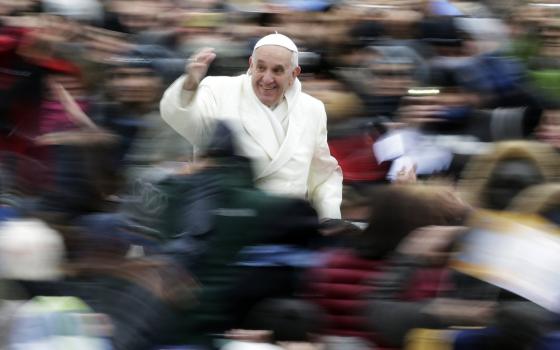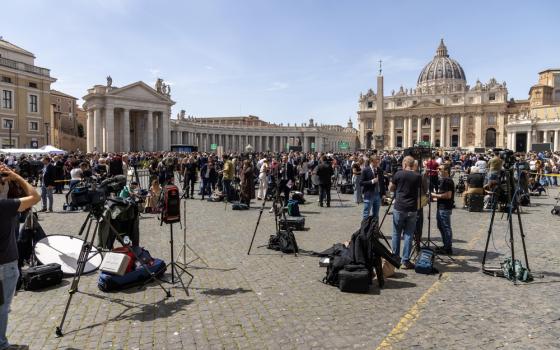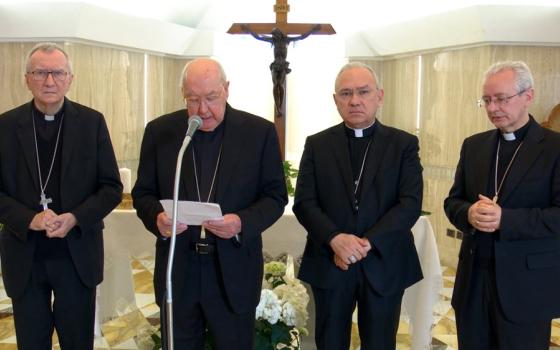SPRINGFIELD, Mass. -- Saying that he "cannot conclude that the condition of the steeple presents an emergency such that immediate court intervention is necessary," a Massachusetts Superior Court judge has denied a motion that would have evicted protesters from a former Catholic church in the Diocese of Springfield.
Ruling on an Oct. 4 motion filed by the diocese, Judge C. Jeffrey Kinder decided that a preliminary injunction that would have allowed law enforcement officials to remove occupiers protesting the closure of Mater Dolorosa Church in Holyoke so that repairs could be made to its damaged steeple was not necessary.
Reacting to the judge's ruling, diocesan spokesman Mark E. Dupont said: "Clearly we were disappointed that the court failed to rule on the central issue in this matter upholding our trespassing claim."
However, he stressed that, "as the judge clearly states, he has offered no ruling or decision on the basic merits of the trespassing case, simply that he will not issue a preliminary injunction at this time.
"Given his failure to issue such an injunction, we will do our best to maintain the safety of the structure while this plays out in the courts," said Dupont.
In an Oct. 17 written ruling released to the media Oct. 28, Kinder noted that engineers for the Roman Catholic Bishop of Springfield, the legal name of the diocese, claim the wooden steeple on the century-old church "presents an immediate danger." But he also noted that an engineer hired by the group Friends of Mater Dolorosa claims that "the bell tower/steeple is clearly not in danger of falling down" and that "Mater Dolorosa Church is in the best physical condition of any of the churches I have investigated."
The judge ruled that since "as of now, based on the evidence before me, I cannot conclude that the condition of the steeple presents an emergency such that immediate court intervention is necessary," the bishop had not demonstrated that he had suffered irreparable hardship" if the demonstrators were not removed immediately.
Under the law, a party who seeks a preliminary injunction from a judge must meet three criteria to prevail. First, the party must establish that he is likely to prevail when his legal dispute is brought to trial in a court.
Second, he must demonstrate that he would suffer irreparable harm without the injunction. And third, his irreparable harm cannot be outweighed by the irreparable harm caused to his opponent if the injunction is granted.
Kinder's ruling means that only a decision by a judge or jury after full trial will likely lead to the eviction of the protesters.
As part of the pastoral planning process in Holyoke earlier this year, the diocese had ordered an evaluation of the physical condition of its buildings in the city. That evaluation raised concerns about the condition of the Mater Dolorosa's steeple, and other issues. A subsequent engineering study estimated that it would cost $250,000 to $350,000 to repair the steeple. A second study estimated the repair at $112,000.
The state of the Mater Dolorosa building, along with its mounting debt and other reasons, was cited by Springfield Bishop Timothy A. McDonnell when he decided to use the former Holy Cross Church as the site for the newly merged Our Lady of the Cross Parish, effective July 1. Mater Dolorosa closed June 30.
After heckling the bishop as he entered the church to celebrate final Mass June 27, a group of former parishioners began a continuous occupation of the church. The vigilers, as they call themselves, have ignored two "no trespassing" notices issued to them by the diocese during the summer.
The diocese contends that with the onset of winter, the danger of a steeple collapse grows, and that repair crews are unwilling to remove the steeple while persons are occupying the buildings.
Victor Anop, an attorney who leads the Friends of Mater Dolorosa, argued in court in October that he was in the church during a July 26 microburst windstorm that damaged nearby buildings in Holyoke and the church was unharmed.
He accused Bishop McDonnell of being "disingenuous" in saying that the diocese needed the protesters out of Mater Dolorosa so it can remove the steeple for safety reasons.
"They had their report in May," Anop said. "Either the bishop was reckless in keeping the church open for weeks up until the closing Mass on June 30, or he knew that the church isn't really unsafe."
Dupont disputed that argument.
"Our concern was always with regard to the stresses of another winter and we remain as concerned as ever for the safety of those occupying the church and those in the surrounding neighborhood," Dupont said. "No one would assert that the recent weather stresses, or the natural aging condition of that steeple, have made it any safer since our initial analysis was conducted by an independent engineering firm."
Dupont said the diocese would seek a speedy trial to resolve the question.



